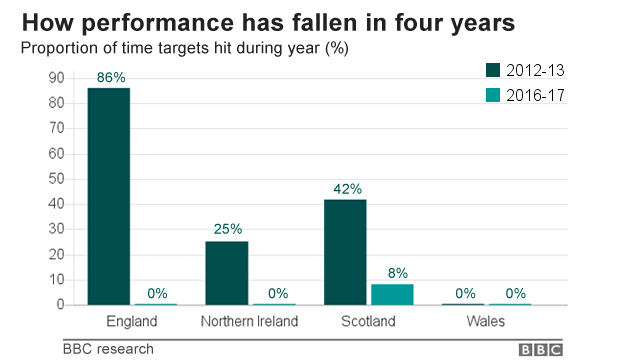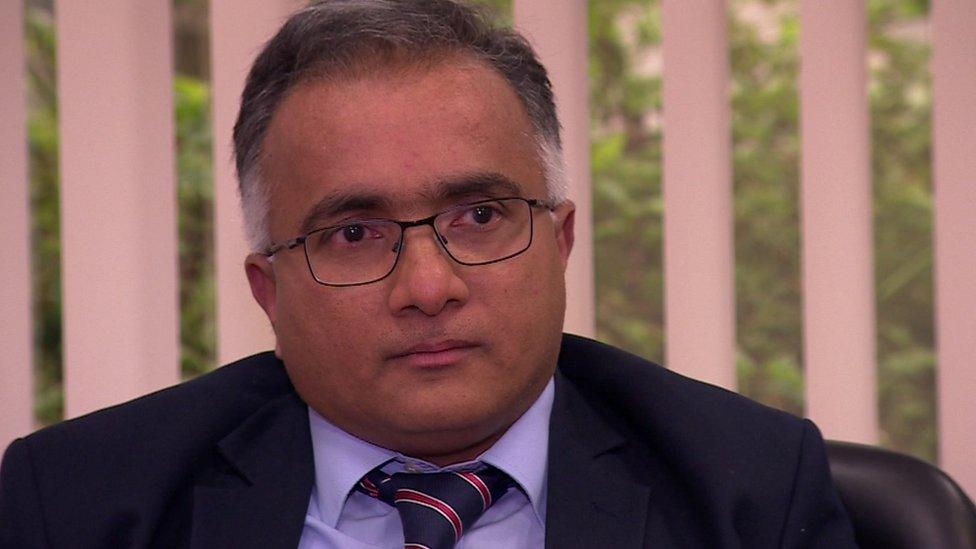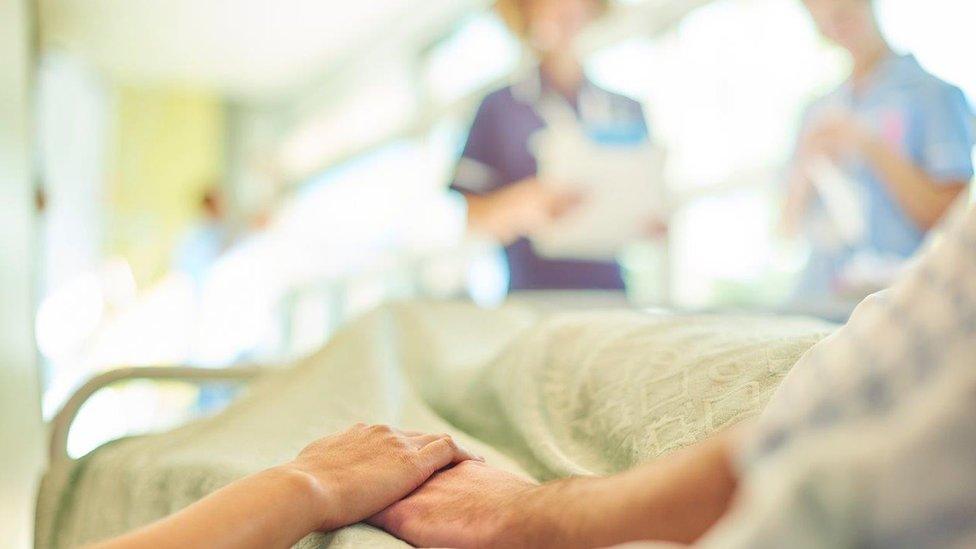NHS waits for cancer care, A&E and ops worsen across UK
- Published

The performance of hospitals across the UK has slumped with targets for cancer, A&E and planned operations now being missed en masse, BBC research shows.
Nationally England, Wales and Northern Ireland have not hit one of their three key targets for 18 months.
Only Scotland has had any success in the past 12 months - hitting its A&E target three times.
Ministers accepted growing demand had left the NHS struggling to keep up as doctors warned patients were suffering.
The findings are being revealed as the BBC launches its online NHS Tracker project, which allows people to see how their local service is performing on three key waiting time targets:
Four-hour A&E waits
62-day cancer care
Planned operations and treatment
If you can't see the NHS Tracker, click or tap here, external.

The BBC has looked at performance nationally as well as locally across the 135 hospital trusts in England and 26 health boards in the rest of the UK.
Locally there is just one service in the whole of the UK - run by Luton and Dunstable NHS Trust - which has managed to hit all three targets each time over the past 12 months.
Hospital staff the BBC has talked to have described how shortages of doctors and nurses, a lack of money and inadequate room in A&E departments in particular was making it difficult, sometimes impossible, to see patients quickly enough.
While overall the vast majority of people are still being seen in time, the BBC investigation shows how declining performance is affecting patients.
For example, the chances of not being seen in four hours in A&E has actually more than doubled in the past four years, with one in nine patients now waiting longer than that.
The NHS on the slide

The BBC research has found:
Wales has consistently failed to hit its targets. In 2012-13 it did not hit any of its monthly key hospital targets and in 2016-17 it was the same. The last time a target was achieved nationally was 2010.
England has seen the biggest deterioration. In 2012-13 it hit its key hospital targets 86% of the time, but in the last year it has missed every monthly target.
Scotland is the only part of the UK to hit its targets during the last 12 months, but has only managed to hit do that three times over the summer in A&E when pressures tend to be at their lowest.
Northern Ireland is failing to hit its targets despite making it easier to hit the goal for planned operations and care. Since March 2015 it has gradually reduced the target from 80% to 55% but has still not hit it.
The north-east is the top performing region in England. Services have hit their key hospital targets 71% of the time in the past year.
Twelve out of 135 English hospital trusts, four out of five Northern Irish health trusts and five out of seven Welsh trusts have failed to hit any target in the past 12 months.
'We don't have enough doctors'

Cancer doctor Prof Madhusudan suggests there are not enough staff to see the patients quickly enough
Prof Srinivasan Madhusudan, head of cancer at Nottingham University Hospitals NHS Trust, which has not hit the cancer target since April 2014, suggested there was simply not enough staff to cope.
"When I get to work I want to treat my patients as soon as I can. So do my colleagues."
But he added there was a limit to what could be done, pointing out there are 5,000 new cases a year at his hospital trust.
"There are only so many patients that you can treat.
"We have a team of 22 fantastic oncologists who are working very hard to do the best they can under what is quite a stressful situation."
Meanwhile, Ali Refson, an A&E consultant at London's Northwick Park hospital, said demand was "incredibly high" which meant it was very hard to hit the four-hour target.
"We sometimes feel we can't give the best care. We are working the hardest we can, but we are only human."
What does this mean for patients?

Ministers across the UK have been quick to point out that most people are still being seen in time.
But the numbers waiting longer for care have been rising.
In A&E patients are now twice as likely to wait more than four hours than they were four years ago - 11% compared to 5%.
The proportion of people waiting over 62 days for cancer treatment has risen by a third in the past four years. Nearly one in five patients now wait longer.
The chances of delays before you have a planned operation or treatment, such as a hip replacement, has increased by nearly three-quarters in four years. Currently 12% of patients wait longer than they should.
It means there are now over 500,000 people on hospital waiting lists in England, Wales and Northern Ireland that have waited too long. That compares to nearly 230,000 four years ago.
British Medical Association chair Dr Chaand Nagpaul said the situation highlighted by the BBC was "unacceptable".
He said while for some patients the delays were simply an "inconvenience", for many more they would have a "real impact on their treatment and outcome".
Time for 'honest debate'
Scottish Health Secretary Shona Robison said record levels of investment were being put into the health service in Scotland.
She said efforts were being made to "shift the balance of care away from hospitals" and into the community that should make it easier to hit the targets.
And she added a ministerial working group had been established to improve cancer care.
A spokesman for the Department of Health in England said more money was being spent on services, and said despite the longer waiting times the majority of hospitals were still providing good or outstanding care, according to inspectors.
And he pointed out that because of the ageing population "health systems worldwide face similar pressures".
A Welsh government spokesman acknowledged some people were waiting "too long", but pointed to the rising demand being faced.
The number of A&E visits made each year across the UK has risen by a fifth in four years to top 30 million, while the number of cancer cases has risen by more than a quarter to top 170,000.
Nonetheless, Labour's shadow health secretary in England, John Ashworth, called the decline in performance "staggering".
Saffron Cordery, of NHS Providers, which represents hospital bosses, said it was time to consider whether these targets were still achievable unless more money was provided.
"It's time for an honest debate about what we can realistically expect the health service to deliver in such difficult circumstances."

The services where targets have been missed for whole year
England:
Basildon and Thurrock NHS Trust
Colchester Hospital University NHS Trust
Guy's and St Thomas' NHS Trust
University Hospitals of North Midlands NHS Trust
The Royal Wolverhampton Hospitals NHS Trust
Leeds Teaching Hospitals NHS Trust
Gloucestershire Hospitals NHS Trust
East Kent Hospitals University NHS Trust
Hull & East Yorkshire Hospitals NHS Trust
United Lincolnshire Hospitals NHS Trust
Maidstone & Tunbridge Wells NHS Trust
Worcestershire Acute Hospitals NHS Trust
Wales:
Betsi Cadwaladr University Health Board
Hywel Dda University Health Board
Abertawe Bro Morgannwg University Health Board
Cwm Taf University Health Board
Aneurin Bevan University Health Board
Northern Ireland:
Belfast Health Trust
South Eastern Health Trust
Southern Health Trust
Western Health Trust
Based on performance against the monthly or quarterly targets for A&E, 62-day cancer care and planned operations for the most recent 12 months for which there is data. The way the targets work is different across the UK so the BBC has simply looked at whether the key targets are being me in each nation.

Research by the BBC's data journalism unit

Are you a patient currently facing a long wait for treatment? Or perhaps you work in the NHS? Share your views and experiences by emailing haveyoursay@bbc.co.uk, external.
Please include a contact number if you are willing to speak to a BBC journalist. You can also contact us in the following ways:
WhatsApp: +447555 173285
Tweet: @BBC_HaveYourSay, external
Send pictures/video to yourpics@bbc.co.uk, external
Send an SMS or MMS to 61124 or +44 7624 800 100